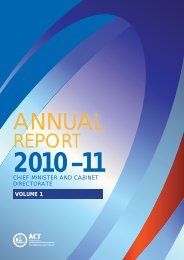Governing the City State - Chief Minister and Treasury Directorate ...
Governing the City State - Chief Minister and Treasury Directorate ...
Governing the City State - Chief Minister and Treasury Directorate ...
You also want an ePaper? Increase the reach of your titles
YUMPU automatically turns print PDFs into web optimized ePapers that Google loves.
A more significant improvement would be to mirror Commonwealth Government practice<strong>and</strong> include an annual supplementary appropriation process in <strong>the</strong> Budget cycle. Thesupplementary appropriation has been used a number of times in recent years (2004-05,2007-08 <strong>and</strong> 2008-09), but not in an integrated way. Instituting this supplementary processwould have a number of advantages:• <strong>the</strong> Assembly would have ano<strong>the</strong>r formal opportunity to scrutinise government activity<strong>and</strong> service delivery plans;• it would reduce pressure on, <strong>and</strong> allow a reduction in, <strong>the</strong> Treasurer’s Advance;• it would facilitate more agile government;• holding <strong>the</strong> “spending between Budgets” line would be more practical;• <strong>the</strong> option would exist for <strong>the</strong> Government to reconsider achievement of priorities <strong>and</strong>allocate, or reallocate funding as required;• certain proposals for capital works or recurrent initiatives could be considered in April<strong>and</strong> ra<strong>the</strong>r than funded in <strong>the</strong> Budget, deferred for fur<strong>the</strong>r work <strong>and</strong> analysis <strong>and</strong>reconsideration mid-year. This would avoid <strong>the</strong> Cabinet being pressured into agreeing toa proposal because it is unwilling to delay funding decisions by 12 months; <strong>and</strong>• consideration of <strong>the</strong> supplementary appropriations could coincide with <strong>the</strong> annual prioritysetting process, fur<strong>the</strong>r integrating <strong>the</strong> priority setting <strong>and</strong> decision making processes.Creation of ano<strong>the</strong>r formal opportunity for consideration of new spending proposals might –perversely – encourage more bids to be brought forward than <strong>the</strong>re might o<strong>the</strong>rwise be. Inpart, <strong>the</strong> mitigation of this risk lies in <strong>the</strong> h<strong>and</strong>s of <strong>Minister</strong>s <strong>and</strong> <strong>the</strong> Strategic Board infollowing <strong>the</strong> clear <strong>and</strong> sensible process rules set out in <strong>the</strong> Cabinet H<strong>and</strong>book.One means of perhaps limiting <strong>the</strong> scope of any perverse outcomes would be to focus <strong>the</strong>supplementary appropriation round principally on capital projects. This would align with <strong>the</strong>processes already followed by <strong>the</strong> Budget Committee of Cabinet in regularly reviewingprogress in <strong>the</strong> delivery of <strong>the</strong> capital works program, but would also reduce pressure to fundprojects in <strong>the</strong> Budget for which all necessary preparatory work may not have been settled.In an annual funding cycle, <strong>the</strong>re is an underst<strong>and</strong>able pressure to fund final design <strong>and</strong>construction through <strong>the</strong> Budget, whereas a planned supplementary process would, forexample, permit final funding decisions to be based on settled design processes.Streng<strong>the</strong>ning Budget Coordination - Alignment <strong>and</strong> ConsistencyThe current Budget cycle is well understood by officials <strong>and</strong> supports delivery of <strong>the</strong> Budgetin May each year. There is clearly scope, however, for that process to be improved. Perhapsmost importantly, <strong>the</strong> process would be enhanced by more closely aligning it with <strong>the</strong>achievement of government priorities (which would also assist in reducing <strong>the</strong> inefficiencythat comes through <strong>the</strong> preparation of unnecessary budget proposals), <strong>and</strong> through <strong>the</strong>exercise of a stronger role by <strong>the</strong> Expenditure Review <strong>and</strong> Evaluation Committee in <strong>the</strong>management of <strong>the</strong> Budget process, as well as in <strong>the</strong> preparation of consolidated <strong>and</strong>comprehensive briefing to support <strong>the</strong> Budget Committee of Cabinet’s decision making.Strategy, Resource Allocation <strong>and</strong> <strong>the</strong> Vacant Middle Ground: 236



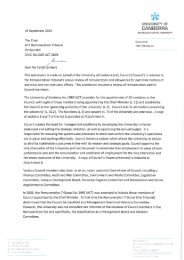
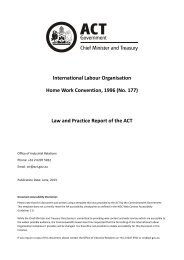
![HSR Training Programs Guidelines [ PDF 191KB]](https://img.yumpu.com/51348280/1/190x245/hsr-training-programs-guidelines-pdf-191kb.jpg?quality=85)


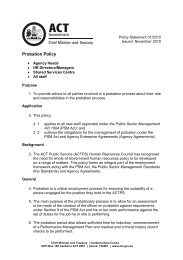
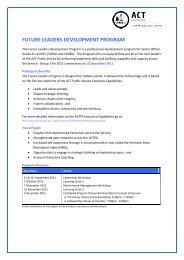

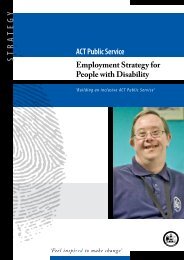
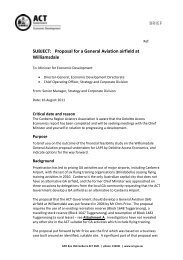
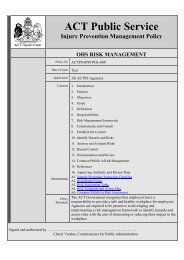
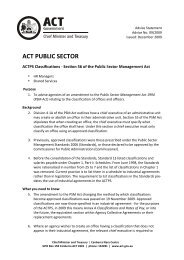
![Teachers Technical and Further Education [ PDF 68KB]](https://img.yumpu.com/34230751/1/184x260/teachers-technical-and-further-education-pdf-68kb.jpg?quality=85)
